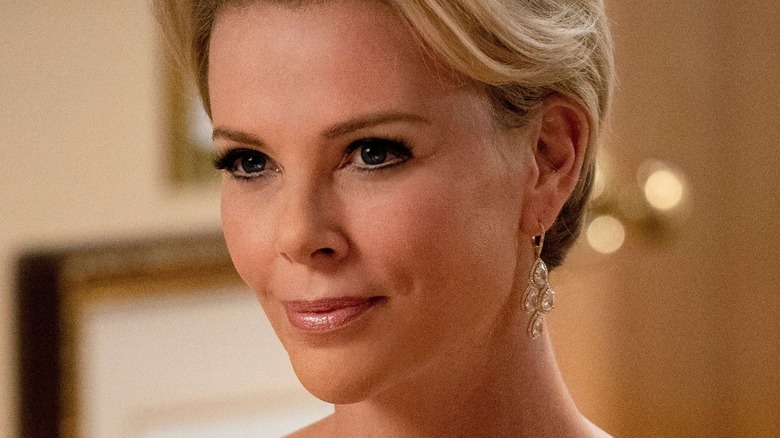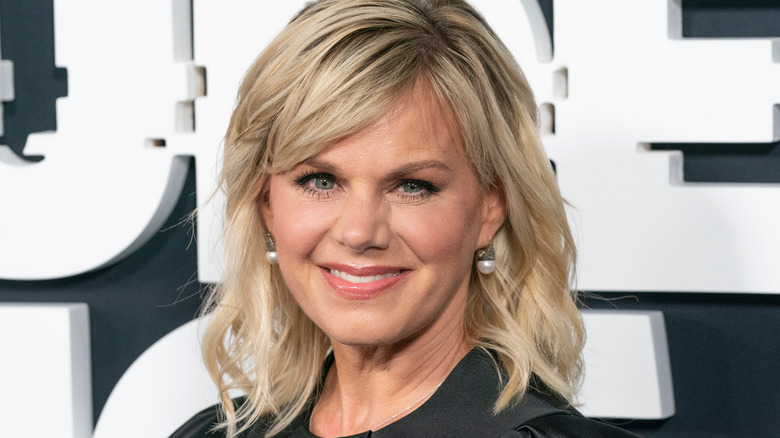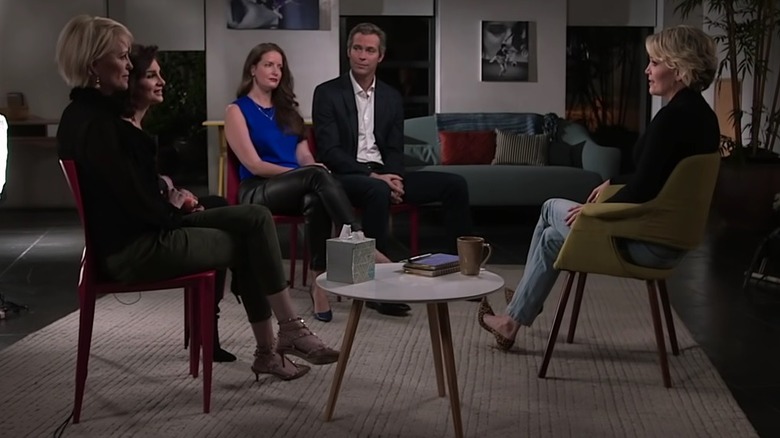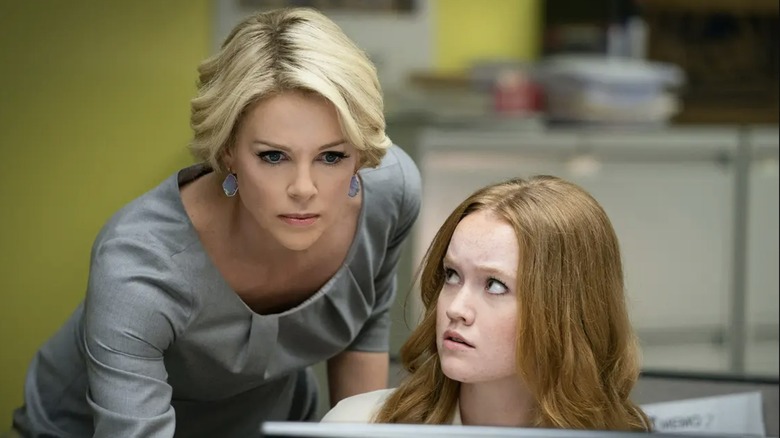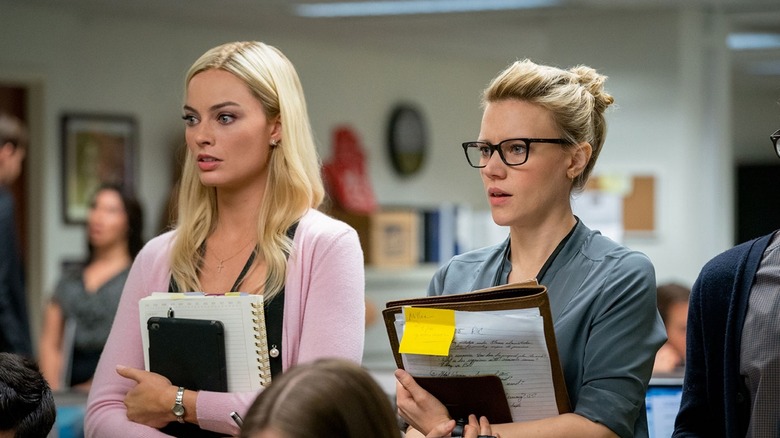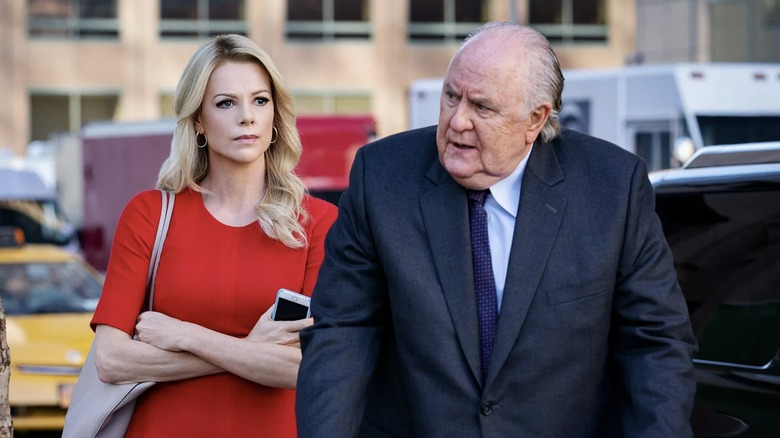Everything Bombshell Doesn't Tell You About The True Story
The following article includes allegations of sexual assault and misconduct.
2019 brought us a critically acclaimed based-on-a-true-story film in the form of "Bombshell," directed by Jay Roach and written by Charles Randolph. This drama follows three central characters working at Fox News: Gretchen Carlson (Nicole Kidman), Megyn Kelly (Charlize Theron), and Kayla Pospisil (Margot Robbie). After losing her job in unfair circumstances, Carlson files a lawsuit against Fox News boss Roger Ailes (John Lithgow) for sexual harassment (via Variety). Kelly then comes forward with her own case of harassment, followed by more than 20 other women (via Vulture). Roger Ailes is eventually forced to resign from his position at Fox News in July 2017, and dies the following year.
The film outlines an extremely important time in the U.S. surrounding the 2016 presidential race, and highlights the right-wing bias of Fox News, which is depicted as being riddled with misogyny and enabling inappropriate power dynamics. The real-life events upon which "Bombshell" is based were pivotal for the early #MeToo movement (via Variety), and the film does its best to present this authentically. However, as with any film rooted in reality, directors and writers are able to take creative liberties for the benefit of the story — and take them they do. Many films like "Bombshell" are heavily embellished to assist the transition from just education to entertainment. This inevitably leaves holes in the story, though, as not everything can be included. Let's break down exactly what was missed from this important story.
The first allegation
In "Bombshell," the film outlines the first account of allegations as appearing in 2016 from Fox News anchor Gretchen Carlson. This, of course, acts as the catalyst for the downfall of Roger Ailes, but it's not exactly how things went down. The initial allegation of misconduct came from a Ailes biography in 2014, "The Loudest Voice in the Room" by Gabriel Sherman. This biography was a point of contention for Ailes, and he had tried to suppress it from being released. In an article at The Ringer, Sherman wrote: "Although he may not have intended it, Ailes' confrontational response to the reporting of this book was as revealing as any comment he would have made in the course of an extended interview."
According to the Los Angeles Times, the book described how Ailes was willing to pay a female producer an additional $100 a week to have sex with him. It was two years later that Carlson made her first statement against Ailes and the scandal spilled out into the public eye, leading to much more extensive coverage. For the purposes of "Bombshell," the narrative begins with Carlson's allegation, perhaps to portray the events from the point of the view of the main female characters. It is, however, important to recognize that this abuse of power from Ailes may have dated back more than 10 years before Carlson spoke out.
Life with Ailes
Another difference between the film and real life may be the intensity of toxicity that is portrayed. There was an overwhelming consensus during a sit-down discussion between Megyn Kelly, former Fox News host Juliet Huddy, former Fox News reporter Rudi Bakhtiar, and former "Fox News Live" associate producer Julie Zann that the atmosphere that Roger Ailes created in the workplace was much more extreme than portrayed in "Bombshell." Additionally, in a Time magazine article about "Bombshell," it's said that Ailes' personality was overwhelming and intimidating, helping to create a climate in which his employess worked in a constant state of fear.
In an interview with Roach, Randolph, and producer Michelle Graham, Graham highlighted that Ailes would isolate the women from one another and pit them against each other. The reality of this workplace would be extreme for those who experienced it and perhaps difficult to capture in one film. In Kelly's group discussion, Zann, when asked for her first thoughts after watching the film, commented that it let Ailes off too easy. Though the film did capture some of the situations of assault as well as the tense working environment, Zann emphasized that it was considerably worse when she was living through it.
The Republican presidential debate
Perhaps one of the most infamous moments in the film arrives when Megyn Kelly is questioning then-presidential candidate Donald Trump in 2015 on Fox News. This part was factual — the real Megyn Kelly came down hard on Trump in regard to his blatant misogyny and sparked controversy when she asked him, "You've called women you don't like fat pigs, dogs, slobs and disgusting animals ... Your Twitter account has several disparaging comments about women's looks ... Does that sound to you like the temperament of a man we should elect as president?"
In "Bombshell," this is word-for-word in accuracy, but viewers are led to believe that Kelly discussed this question before the debate with Lachlan and James Murdoch. Ultimately, though, this wasn't true. The real Megyn Kelly addressed this in the discussion mentioned above after watching the movie for herself, describing it as a "fantasy." In addition, the movie portrays Ailes as giving Kelly a pat on the back for this situation, and perhaps unsurprisingly, this was also untrue. Kelly reported in real life that Ailes was furious over her line of questioning, telling her that there was to be "no more female empowerment stuff." It's unclear why Jay Roach and Charles Randolph decided to change this in "Bombshell," but Kelly was quick to debunk it.
The victim shaming
When other victims come forward against Ailes, the movie portrays Kelly as keeping herself separate from them. She is almost indifferent to the other women and appears to prioritize herself and her career. A scene with Kayla and Megyn displays a case of victim shaming from Kayla — with her placing the blame on Megyn for her own assault because she did not speak out. This fabricated moment was addressed in the Kelly panel by former "Fox News Live" associate producer Julie Zann: "This is shameful because it is unfactual — it is victim shaming... this is sending the wrong message."
During the discussion, Kelly went on to say that she found the scene to be counterproductive in regards to the #MeToo movement overall, hinting that it was inaccurate about the women's relationship because a man wrote it. Her other panelists labeled her as a support system during the tumultuous time in real life. This creative liberty may have just been an oversight for the director and writer, particularly because Kayla Pospisil was a fictional character to begin with.
Roger Ailes and Gretchen Carlson
The film does an excellent job at chronicling the way Gretchen Carlson took full control of the situation by filing a lawsuit against Ailes after an extended period of inappropriate behavior at Fox News. "Bombshell" does show the audience how angry Ailes was at Carlson. However, what the film misses is just how far this hatred went during their working relationship. In a Vanity Fair article by ex-staff member Alisyn Camerota, she describes a conversation she had with Ailes wherein he had allegedly threatened the safety of Carlson.
According to Camerota, the conversation took place as follows: "'Now, all you have to do is kill Gretchen' ... I paused. 'In the ratings, right?' ... 'Let's start by killing her in the ratings. Then we'll see what happens.'" These further discoveries enable us to see Ailes in candid conversations that he was unaware were being written down. His deep dislike for Carlson is right in the center of "Bombshell," and this chilling exchange emphasizes just how far this goes.
What Kayla Pospisil represents
Margot Robbie's character is an amalgamation of the many women that came out with allegations against Roger Ailes. Kayla Pospisil is a fictional person created solely for the film but does reflect the specific experiences of victims. During a post-screening Q&A with Jay Roach and Charles Randolph, they discussed the importance of their research ahead of making this film in order to create an accurate and faithful representation. Randolph highlighted his various interviews with victims who wished to share their stories, noting that through this, he was able to create the character of Kayla to represent them in a fictional but authentic way. According to Randolph, important details — down to the specific scene with Kayla and Ailes — were taken accurately from these interviews.
Viewers of the film may wonder if the victims felt represented correctly. In the panel with Megyn Kelly, Juliet Huddy commented that the film "did a good job trying to give a realistic portrayal of what it's like." Rudi Bakhitar agreed, stating, "It really puts people in our shoes." The inclusion of Kayla in the film as a composite allowed these other ex-Fox News workers to have their stories heard.
Roger Ailes' mind control
As mentioned earlier, Alisyn Camerota's Vanity Fair article was extremely informative. Through her own account of life working with Ailes, we see a story that was not shown in "Bombshell." This is not something the film necessarily got wrong, but more an extension of Ailes' ability to control his employees. This piece takes what we know about Ailes from "Bombshell" and expands on it, giving us further understanding of what it was like for these women to work under Ailes and experience his manipulative and abusive behavioral streak.
Camerota, in between inappropriate advances from Ailes, was promoted and began anchoring shortly after joining Fox News. Ailes was in charge of what she said on air, and would frequently berate her for her opinions. When Camerota attempted to branch out and explore new opportunities outside of Fox News, Ailes stopped this from happening. After one such audition, she received a message: "How did your audition go?" It was clear that Ailes was able to keep tabs on everyone he employed, and Camerota was informed by her agent that no more offers would be forthcoming. "No one wants to cross Roger," the agent told her. This woman's career was controlled by Ailes and she had no way of stopping it.
The dress code
There is a considerable amount of emphasis placed on the appearances of women at Fox News. In "Bombshell," all the leading women are dressed in skirts, dresses and high heels. We learn that this is a rule enforced by Ailes and it was a bigger issue than explored in the film. In "The Loudest Voice In The Room," Ailes is documented to have said (via Media Matters), "Move that damn laptop, I can't see her legs," while watching weekend anchor Kiran Chetry's show.
An article in Vogue explored this rule: "The Fox dress code for women? Short skirts were required and pants were banned." In an article from The Guardian, however, a Fox News spokesperson said, "No edict exists on what women are required to wear." While we cannot be sure what is true, it appears that the women were not given much freedom in regards to their appearance. Ex-Fox News reporter Juliet Huddy commented on this: "I was told 'no pants'," says Huddy. "I was pulled off the air and suspended for a few days because I wore a — what I thought was cute — denim jacket. We learned really quickly what was OK."
Ignored morals?
"Bombshell" does not precisely ignore the fact that most of these women were and are conservative and right-wing, while some are also religious. However, some viewers did feel that this was glossed over to make sure that audience members of different political or spiritual persuasions would still root for them. Film critic Manohla Dargis explored this in her New York Times review, writing, "[It's] about female employees who ... worked for a conservative political force who institutionalized the harassment of women. So, how do you make heroines out of characters that some in the audience will see as deeply compromised if not outright villainous?"
She mentions how the casting of Theron, Kidman and Robbie was clever; viewers will see faces they know and love, and not dig into the potentially problematic nature of the real-life views of Kelly or Carlson. However, Dargis does go on to comment that the film "does a good job of presenting the ordinary assaults that women, even those with great privilege, can endure simply to get through a day."
Rudi Bakhtiar's struggle
Portrayed in "Bombshell" by Nazanin Boniadi, Rudi Bakhtiar was a Fox News journalist who came out with allegations against Brian Wilson (via New York), the former Fox News Washington bureau chief. This incident is shown accurately in the film, down to the specific words used by Wilson. However, Bakhtiar's story goes further than this, as she progressed from her first experience of sexual misconduct at Fox News to standing up alongside Gretchen Carlson.
Following her confrontation with Wilson, she rejoined Fox News on "Fox and Friends." Once there, she was faced with sexism in regards to her appearance, and began to feel that her responsibilities had been heavily altered as a result of her refusing Wilson's sexual advances. Despite writing to Fox News programming executive Bill Shine that she felt like she was being gradually cast aside on the show and the network due to the Wilson issue, she was let go by Roger Ailes a short time later.
Juliet Huddy's NDA
Former Fox News anchor Juliet Huddy allegedly met with "Bombshell" screenwriter Charles Randolph to consult on the film in her own words and to share her own experience with Fox News. Huddy told The Hollywood Reporter that although her discussions with Randolph violated her nondisclosure agreement with Fox, she felt like she had nothing left to lose: "I lost my house. My television career combusted, and I couldn't get a job for over a year ... come after me. I don't have anything."
Gretchen Carlson was not able to break her NDA, nor was Megyn Kelly. Charlize Theron commented on this, saying, "We have all taken an oath to protect our sources ... But we tried to communicate as much as we could with everybody." While Huddy struggled for a while following her departure from Fox News, she is now a successful talk radio host and podcaster.
The ongoing issue
While the message of "Bombshell" is an extremely important one and tells the story of a pivotal event for the #MeToo movement, there is one more thing that is misrepresented in the film. By the end of the movie, it appears that the resignation of Roger Ailes completely fixes all of the sexual misconduct problems on Fox News. However, the right-wing news company continued to weather allegations against Fox News journalists following the settling of Gretchen Carlson's lawsuit. In April 2017, The New York Times reported that Wendy Walsh claimed she was not given a job at the network as a result of turning down sexual advances from then-host Bill O'Reilly.
More recently, The Guardian reported in July 2020 on new allegations of sexual abuse and assault against former national correspondent Ed Henry and a few other big Fox personalities. The lawsuit filed against the men made its point clear, stating, "Fox News would have the public believe that it is a different place from the Fox News that was run by former disgraced Chairman and CEO Roger Ailes. Unfortunately, it is actually worse."
While it doesn't cover everything, "Bombshell" does a good job of addressing events that otherwise get overshadowed, and the film does still serve as an important beacon of hope for the wider movement.
If you or anyone you know has been a victim of sexual assault, help is available. Visit the Rape, Abuse & Incest National Network website or contact RAINN's National Helpline at 1-800-656-HOPE (4673).
